2-Methylaziridine
- CAS NO.:75-55-8
- Empirical Formula: C3H7N
- Molecular Weight: 57.09
- MDL number: MFCD00005118
- EINECS: 200-878-7
- SAFETY DATA SHEET (SDS)
- Update Date: 2025-01-06 13:21:43
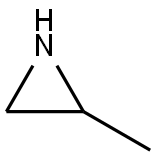
What is 2-Methylaziridine?
Chemical properties
colourless oily fuming liquid
Chemical properties
Propyleneimine is a fuming, colorless, oily liquid with a strong ammonia-like odor.
The Uses of 2-Methylaziridine
The renal papillary toxin.
The Uses of 2-Methylaziridine
Intermediate in production of polymers, coatings, adhesives, textiles, and paper finishes.
Definition
ChEBI: 2-Methylaziridine is a member of aziridines.
General Description
A clear colorless liquid with an ammonia-like odor. Flash point 25°F. Toxic by ingestion, inhalation and through skin absorption. Less dense than water. Vapors are heavier than air. Produces toxic oxides of nitrogen during combustion. Under prolonged exposure to fire or heat the containers may rupture violently and rocket. Used as an organic intermediate.
Air & Water Reactions
Highly flammable. Soluble in water. Reacts slowly and non hazardously with water to form propanolamine or methylethanolamine.
Reactivity Profile
PROPYLENEIMINE, [INHIBITED] is subject to violent polymerization on contact with an acid. (The inhibitor is intended to prevent polymerization). Incompatible with isocyanates, halogenated organics, peroxides, phenols (acidic), epoxides, anhydrides, and acid halides. Flammable gaseous hydrogen is generated in combination with strong reducing agents, such as hydrides.
Hazard
Flammable, dangerous fire risk. Toxic by ingestion, inhalation, and skin absorption. Upper respiratory tract irritant and kidney damage. Possi- ble carcinogen.
Health Hazard
Toxic after acute exposure. Can severely irritate eyes, skin, and lungs.
Fire Hazard
Chemical is extremely flammable; vapors are heavier than air. Toxic oxides of nitrogen are produced during combustion. Avoid acids, strong oxidizers. Thermally unstable. Hazardous polymerization may occur. Contact with acid promotes violent polymerization.
Safety Profile
Confirmed carcinogen with experimental carcinogenic data. Poison by ingestion and skin contact. Moderately toxic by inhalation. Mutation data reported. Severe eye irritant. Implicated as a brain carcinogen. A flammable liquid and very dangerous fire hazard when exposed to heat or flame; can react vigorously with oxidizing materials. Polymerizes explosively on exposure to acids or acid fumes. A storage hazard. When heated to decomposition it emits toxic fumes of NOx.
Potential Exposure
Propyleneimine is used in the modifi- cation of latex surface coating resins; in the production of polymers for use in the paper and textile industries as coat- ings and adhesives.
Carcinogenicity
2-Methylaziridine is reasonably anticipated to be a human carcinogen based on sufficient evidence of carcinogenicity from studies in experimental animals.
Shipping
UN1921 Propyleneimine, stabilized, Hazard Class: 3; Labels: 3-Flammable liquid, 6.1-Poisonous materials.
Incompatibilities
Vapors or liquid form explosive mixture with air. Incompatible with oxidizers (chlorates, nitrates, peroxides, permanganates, perchlorates, chlorine, bromine, fluorine, etc.); contact may cause fires or explosions. Keep away from alkaline materials, strong bases, strong acids, oxoacids, epoxides, water, carbonyl compounds; quinones, sulfonyl halides. May explode in heat. Subject to violent polymerization in contact with acids. Hydrolyzes in water to form methylethanolamine.
Waste Disposal
Consult with environmental regulatory agencies for guidance on acceptable disposal practices. Generators of waste containing this contaminant (≥100 kg/mo) must conform with EPA regulations governing storage, transportation, treatment, and waste disposal. Controlled incineration (incinerator equipped with a scrubber or thermal unit to reduce nitrogen oxides emissions).
Properties of 2-Methylaziridine
| Melting point: | -65°C |
| Boiling point: | 66°C |
| Density | 0.8 |
| refractive index | 1.4125 |
| Flash point: | -4°C |
| storage temp. | -20°C |
| solubility | soluble in No data available |
| pka | pK1:8.18(+1) (25°C) |
| form | Flammable liquid |
| Water Solubility | miscible |
| Stability: | Unstable - readily polymerises in the absence of an inhibitor. May polymerize vigorously or explosively in the presence of acids. Flammable. Incompatible with acids, oxidizing agents, quinones, carbonyl compounds, sulfonyl halides, some types of plastic, water. |
| CAS DataBase Reference | 75-55-8(CAS DataBase Reference) |
| IARC | 2B (Vol. 9, Sup 7, 71) 1999 |
| NIST Chemistry Reference | Aziridine, 2-methyl-(75-55-8) |
| EPA Substance Registry System | Propyleneimine (75-55-8) |
Safety information for 2-Methylaziridine
Computed Descriptors for 2-Methylaziridine
New Products
Tert-butyl bis(2-chloroethyl)carbamate (S)-3-Aminobutanenitrile hydrochloride N-Boc-D-alaninol N-BOC-D/L-ALANINOL N-octanoyl benzotriazole 4-Hydrazinobenzoic acid 3,4-Dibenzyloxybenzaldehyde Electrolytic Iron Powder 1,1’-CARBONYLDIIMIDAZOLE R-2-BENZYLOXY PROPIONIC ACID 4-HYDROXY BENZYL ALCOHOL 1,1’-CARBONYLDI (1,2-4 TRIAZOLE) S-2-CHLORO PROPIONIC ACID (2-Hydroxyphenyl)acetonitrile 4-Bromopyrazole 5-BROMO-2CYANO PYRIDINE 5,6-Dimethoxyindanone 5-broMo-2-chloro-N-cyclopentylpyriMidin-4-aMine 3-(Hydroxymethyl)benzoate N-Boc-2-chloroethylamine 1-Bromo-2-methoxy-3-nitrobenzene N-Methyl-3-cyclopenten-1-amine 2-Bromo-3-hydroxybenzaldehyde 1H-indazole-5-carboxamideRelated products of tetrahydrofuran
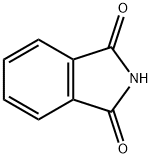

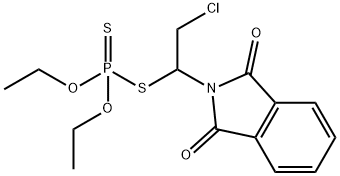
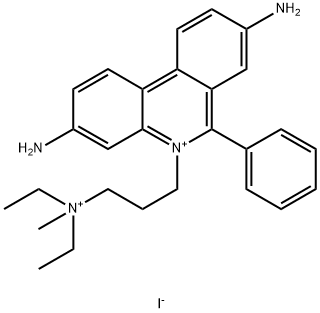
![POLYPROPYLENEIMINE 5G [R]](https://img.chemicalbook.in/)


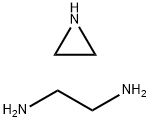
You may like
-
 7441-43-2 98%View Details
7441-43-2 98%View Details
7441-43-2 -
 1260741-78-3 6-Bromo-3-iodo-1-methyl-1H-indazole 98%View Details
1260741-78-3 6-Bromo-3-iodo-1-methyl-1H-indazole 98%View Details
1260741-78-3 -
 (3-Benzyloxypropyl)triphenyl phosphonium 98%View Details
(3-Benzyloxypropyl)triphenyl phosphonium 98%View Details
54314-85-1 -
 4-bromo-3,5-dimethylbenzenesulfonyl chloride 1581266-79-6 98%View Details
4-bromo-3,5-dimethylbenzenesulfonyl chloride 1581266-79-6 98%View Details
1581266-79-6 -
 2490430-37-8 98%View Details
2490430-37-8 98%View Details
2490430-37-8 -
 N-(5-Amino-2-methylphenyl)acetamide 5434-30-0 98%View Details
N-(5-Amino-2-methylphenyl)acetamide 5434-30-0 98%View Details
5434-30-0 -
 124371-59-1 98%View Details
124371-59-1 98%View Details
124371-59-1 -
 53857-52-2 98%View Details
53857-52-2 98%View Details
53857-52-2